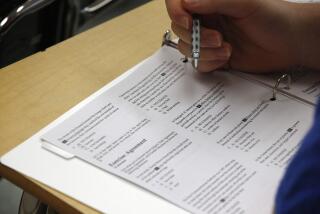Prescription for Learning
- Share via
“Neither reading nor writing flourishes in our blessed United States,” Cleanth Brooks, the eminent literary critic, said recently. “In important respects, we are an illiterate nation.”
Anyone even mildly interested in literature, language and words knows the truth of Prof. Brooks’ lament. Part of the problem, at least, is the increased specialization demanded by a highly specialized world. To meet the needs of the professions and to gain a competitive advantage, many able students embark early on a narrow course of study that leaves gaping holes in their educations. Generalists are scorned, and the idea of a liberal education seems a quaint notion best suited to an earlier time.
Now the Johns Hopkins University School of Medicine in Baltimore has taken a bold step in an effort to reverse the trend and to broaden the scope of a physician’s education. Fearing that undergraduate pre-med majors focus too heavily on science courses, the school has decided to drop the Medical College Admissions Test starting next year. The test is required by 124 of the nation’s 127 medical schools, according to Dr. Richard S. Ross, dean of the Johns Hopkins medical school. “It tends to displace all thinking about a general education,” he says. “The whole thrust of the undergraduate experience becomes a multiple-choice standardized test.”
Ross has urged his counterparts at other medical schools to come up with a minimum core of science courses required for admission and to make the Medical College Admissions Test optional, relying instead on grades, letters of recommendation and personal interviews.
If the proposal is widely adopted, under-graduates planning medical careers would be freer to sample the rich panoply of courses in various fields that make up human knowledge. “Having enough skill in science to become a good physician and having a broad general education are not mutually exclusive,” Ross says. “We want both.”
Of course, standardized tests were adopted in the first place because admissions officers had difficulty comparing grades from one school to another, and letters of recommendation are uniformly glowing. But Johns Hopkins maintains that the standardized admissions test is not a good predictor of success in medical school or as a physician.
The problem of overspecialization is hardly limited to doctors. It may be that people specialize because their interests and abilities are limited, and not the other way around. But physicians, of all people, need to know more than the rigid confines of their discipline. They treat whole patients, and they should bring to that task an appreciation of the fullness of human experience. Johns Hopkins is right to look for ways to broaden the education of future doctors, and other medical schools should join in the effort.
More to Read
Sign up for our Book Club newsletter
Get the latest news, events and more from the Los Angeles Times Book Club, and help us get L.A. reading and talking.
You may occasionally receive promotional content from the Los Angeles Times.









